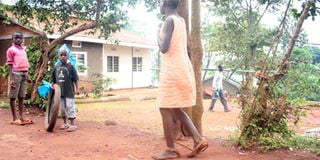Tied to a rope because she is disabled

Lisa is tied to the tree during the day, as her parents go working. Her mother says she returns home at several periods to feed and clean her up. Photo by Abubaker Lubowa.
Although she is 14 years of age, *Lisa cannot eat by herself or talk. She does not play with other children either, and needs help with basic activities. Therefore, her parents tie her to a tree because they feel it is the only way to keep her safe.
Lisa, 14, spends her day tied to a tree near her parents’ home in Nateete with a rope. The rope is fastened onto her right leg. When she is not tied there, the rope remains. The tree is now known as Lisa’s tree.
This is not another case of the nodding disease. Lisa is deaf and mute. Her parents think tying her to the tree is the best way to manage her. While there, she keeps on moving around it. From time to time, she picks anything on the ground and puts it in her mouth. Her sisters keep on removing leaves and sticks so she has nothing to put in her mouth. But that doesn’t deter her from searching for something else. She tries to go as far as her rope allows her and when she finds nothing, she continues moving around the tree and sits down when tired.
All this she does while making sounds similar to that of a goat bleating.
Perhaps the saddest part in this story is that this slender and tall teenager was not born with any abnormality.
“She was born normal and could talk and hear. But when she was two years old, she got malaria and got a seizure. Since then she lost her sense of hearing, talking and she sees only partially,” her mother *May Nakato, says.
She says that even when Lisa was older, she couldn’t sit like other children of her age. Someone advised them to take her to a traditional doctor who advised that a hole is dug and Lisa sit in it for a couple of hours a day with a blanket wrapped around her to keep her straight so as to strengthen her back. After three months, she could sit and even started walking. However, she still couldn’t see well, and when she walked, she kept on bumping and knocking whatever was in her way. That is when her parents started tying her onto a rope.
Nakato says, “I don’t know how the idea came to me. I was helpless when it occurred to me. It was a better solution because we couldn’t afford to take her to a school for the deaf and dumb which is the ideal and best solution.”
An attempt at getting medical help
The seizure 12 years ago was the start of the family’s trips to hospital. Lisa has since been in and out of the hospital. Sometimes she is put on drip. One time she needed a blood transfusion and once, had to be put on oxygen. Usually, she is discharged after staying in hospital for about a week.
The doctors recommended that she is taken to hospital every month for medication saying it would stop her from eating dirty things which the mother says was done for six months. But the parents say there was no change so the teenager continued to spend the day tied on to the tree which is dangerously near an electric pole.
One day a lady saw the child and told Nakato that what she was doing could get her arrested. Nakato acknowledged that and asked her to help them because they had run out of affordable options.
The lady advised her to take the child to Butabika Mental Health Hospital where other children like Lisa stay.
“When we reached there, I found that the children there are not in the same state as my daughter. Though deaf and dumb, they can play with balls, go for short and long calls without help. They also feed themselves and walk with a sense of direction,” says Nakato.
Unlike them, when Lisa is left to walk, she wanders around like a zombie, moving aimlessly and she usually gets lost. Even when she sees other children playing with objects like a ball, she doesn’t seem to have any interest. She doesn’t join in when urged to or even kick or touch the ball when it is given to her.
She urinates and passes stool on herself. When she is given food, she ends up throwing it all over the place because to feed, she scratches it like chicken wasting the food. So she has to be physically fed. But she drinks by herself without taking the cup off her mouth till it is empty and then she throws the cup.
Lisa was taken to Butabika for three days and was given medication. But she got a seizure one day so her father, decided to take her to Mulago Hospital where they were told to take her whenever she got a seizure.
Necessary evil
Though strange at first, the sight of a child tied on the rope is something the neighbours have gotten used to. Her parents have also made their peace with it. It is like a necessary evil. Nakato, a mother of four explains that she has to work to help her husband with financing the home so she can’t stay at home looking after Lisa.
In fact, when her siblings are at school, her mother locks her up inside the house because there is no one to watch over her. “Thankfully, I work nearby so when I leave in the morning, I go back at 10am to give her breakfast and bathe her. I return at 2pm to feed her and at 4pm Lisa is taken to her tree because then, her siblings are around to watch her.”
Though the family says they don’t have relatives with the disability and the rest of the children are normal, before Lisa, they had a child who was in the same state as their daughter. But unlike Lisa he could play, recognised things and when he walked he seemed to know where he was going. He too was tied to a tree during the day because, according to them, it was an easier way to manage him. Unfortunately, he got a seizure and passed on. When Nakato talks about him, it is with a pain in her voice. It explains the emptiness and helplessness with which she talks about Lisa’s state. “I wish we could afford to take her to a school for the deaf and dumb. I am sure it would help.”
Irene Nenduta, a neighbour tried to get help from African Network for Prevention and Protection of Children against Child Neglect and Abuse (ANPPCAN) but wasn’t able to go far. The officials say they think Lisa needs to be taken to a home for children like her but unfortunately ANPPCAN doesn’t know one such. The established ones require that some money is paid, so they are trying to find sponsorship for her.
*Not real names
[email protected]




